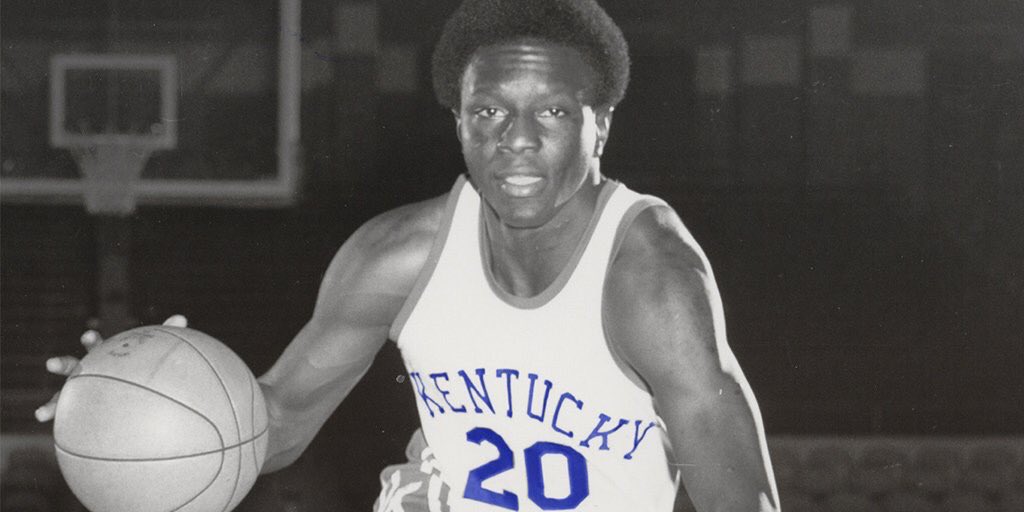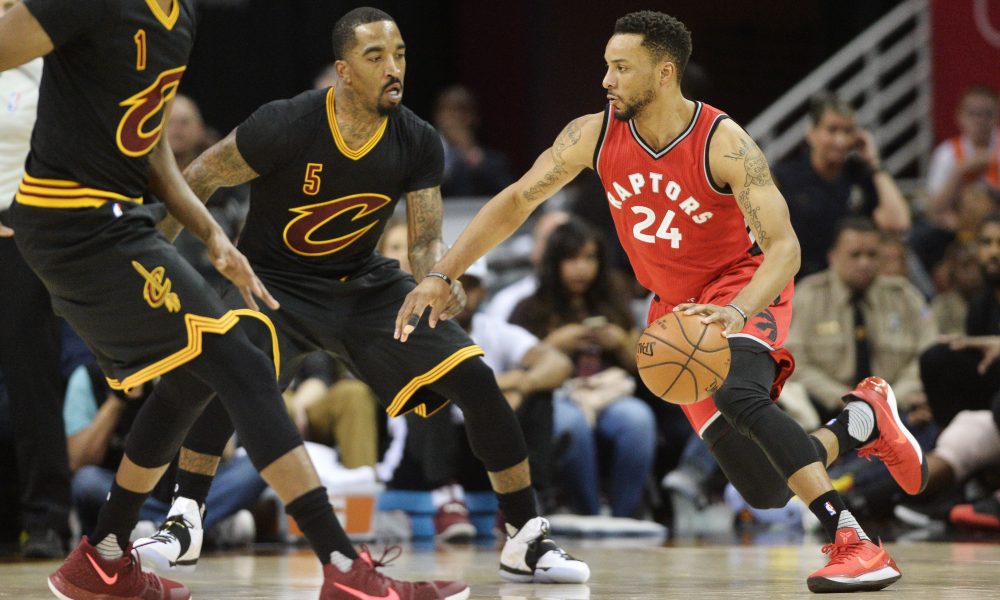You can keep up with all of our player previews here.
For as successful as the Toronto Raptors have been over the last four years, they remain divisive. Consider it the curse of the second tier, where the factors that have helped float a franchise from mediocrity to noteworthiness can become perceived bottlenecks to ascendancy. DeMar DeRozan is among the greatest Raptors of all time, and yet the discussion around his preternatural scoring ability often focuses on whether it’s right, stylistically, for a team that’s been “just” good for nearly half a decade now. Kyle Lowry is an elite point guard by analytic standards and an unrivaled gamer, but the incessant drive to rank and divide lands him in not only debates against the Eastern Conference’s other elite point guards but against his own co-star. Jonas Valanciunas, a productive player and an ace in his role as defined within this offense, has his entire right to exist in the modern NBA questioned.
Good is the enemy of great, and left with no clear means of taking the step from the former to the latter, some appreciation can get lost in the discourse. This is not the fault of any one person or group; it is what sports are and exist to be, an entertainment product that fills air time and quiet, empty hours. Perhaps no part of the greatest stretch in Raptors’ franchise history has been a victim, if it can be called that, of this than Dwane Casey, the Raptors’ winningest, longest-tenured, and most highly decorated head coach.
Casey is, for all intents and purposes, a good coach. It would be difficult to help lead a team of misfit outcasts of seemingly ill fit, on the fly, to unexpected success, and then to maintain it for seasons on end, if one were not a good coach. It would be difficult to help rebuild the entire identity of and culture around it, with buy in from a pair of stars, one of whom can skew prickly, if one were not at least a decent leader of men. It would be difficult to coerce long-term commitment from a patient yet pragmatic team president who did not make the hire himself and who has shown no hesitance in moving swiftly to improve on holdovers or mistakes of his own doing, if one were not a measured, consistent, and effective presence behind a bench.
All coaches are divisive, though. There’s simply too much to focus on and too much that gets no mind at all for the public and media to evaluate all elements of a coach’s performance, and so evaluation often comes down to the obvious and high-leverage minutiae or the broader success of the program. Neither is entirely fair or accurate. Which plays a coach calls with the game on the line is such a tiny sliver of a 365-day-a-year job that it can’t be extrapolated to judge the overall intelligence of the coach. The team’s wider-lens success relies as much on roster as anything. Check any team message board, and 25 teams are likely to have fans calling for a coaching change, maybe more. And yet the NBA is in its longest period without a coach firing in eons. These are not simple situations, with so many pieces of the job and of a franchise being linked inextricably.
That doesn’t mean hands should be thrown up at evaluating a coach, of course, just that it takes some moderation.
To paint with broad strokes, Casey does a much better job with the macro elements of the job than the micro – he fosters buy-in, has created a system where young players have developed reasonably well and contributed despite the team being in win-now mode, and he’s shown to be flexible in the way he thinks about and controls the game. He has become more open to analytic principles over the years, to the point of sending post-game queries to those members of the staff who can provide statistical feedback on what worked and what didn’t, and in what ways. He started Pascal Siakam for 38 games after years of being criticized for only playing veterans (which wasn’t entirely accurate outside of John Salmons, who played about 1,600 minutes more than he should have).
He’s grown more comfortable with smaller lineups, been a pioneering figure in unleashing dual-point guard looks without significant defensive trade-offs, and has made in-series playoff adjustments between games that lined up with the common analysis coming out of prior games. He is smart, mostly well-liked, and open, which are some of the most important traits a coach can have over the course of a season and a career.
And he’s imperfect. His offensive system has long come under criticism for having stars dominate the ball and possessions, a strategy that’s led to consistent top-10 finishes in offensive efficiency in the regular season but sputtered dramatically in the playoffs. The Raptors have played an uglier brand of offensive basketball, and while it’s been a system built around the abilities of two exceptional pick-and-roll scorers, it’s unifaceted nature has made things tough when the leverage of possessions increases. (It’s worth noting here that despite this, the Raptors scored on a larger portion of their after-timeout plays than any team in the NBA last year.) It’s also felt somewhat suffocating in terms of the freedom it’s given other players to grow with limited opportunities, relying so heavily on two (very good) pieces to score (very well). There are trade-offs in trying to maximize each possession through a short-term lens.
Defensively, the Raptors’ performance hasn’t always kept up with Casey’s reputation as a defense-first coach, though he’s long hazarded against that descriptor for himself. Some of that has been talent based, and the scheme has changed and shifted over the years to varying levels of success. Some of the more defense-oriented pieces seemed weary by the end of the year, whether by fault of the system or coaching or the situation alone. Despite all of this, the Raptors were one of just three teams to finish in the top 10 for efficiency at both ends of the floor last season.
This year will be quite telling for Casey. He survived what seemed like a sure axe after the team was swept by the Washington Wizards two years ago, then led the Raptors to their best season ever and earned a three-year contract extension. Last season’s sputter at the finish line had his job status in question, with the term “culture reset” suggesting maybe his time was up. Instead, Ujiri has entrusted Casey to help oversee that culture reset, and how the team responds, particularly with a new offensive style, could go a long way in determining Casey’s future. Ujiri has re-upped the core roster pieces and tweaked frequently, holding Casey and the two stars steady. This entire season will be a big test in terms of how willing – and able – that trio is to fundamentally change their offensive identities.
The preseason was encouraging. The Raptors vaulted from an all-time low in assist percentage to middle-of-the-pack, played at a faster pace befitting their youth in the second unit, and plainly embraced more motion offense principles and the greater value on moving the ball. Casey is opening up more of assistant coach Nick Nurse’s offense, and that ability to trust high-level support without feeling threatened is an important personality trait to have. Whether this rolls over into the regular season is maybe the biggest question facing Casey and the Raptors, as adversity will eventually strike and the instinct may be to revert to what’s worked in the regular season for so long. It sounds as if he has the requisite buy-in now, and in general this was one of the more positive feeling preseasons in recent memory. Again, the culture reset can’t be measured until the game counts and trouble hits, and maybe even until the playoffs.
However it turns out, people are sure to be split on Casey’s performance – the amount of credit or blame he deserves, whether this change came far too late when he had no other choice or whether the difficulty of change in general is worthy of praise, whether shifting the macro elements like culture and youth empowerment is more or less important than end-of-quarter play-calling and Game 1 rotations. This is the lot coaches have in their roles: They are almost exclusively polarizing and an apparent panacea when things go poorly, a topic always worthy of debate. I was a little skeptical a “culture reset” could happen without a coaching change back in July, less so now. Ujiri’s faith in him is warranted, and the staff around him (which even includes a member of the analytics team on the bench now) helps make for a strong team in place. This year will be very telling, and his fault or otherwise, he probably has one of the 10 hottest seats in the league (and maybe five).
Nothing is simple when it comes to discussing coaches, and Casey is no different. He’s a good coach who, like most coaches not in the Steve Kerr/Gregg Popovich echelon, has areas to nitpick and a dearth of job security. That’s just part of the job.
Photo courtesy Raptors.com.



